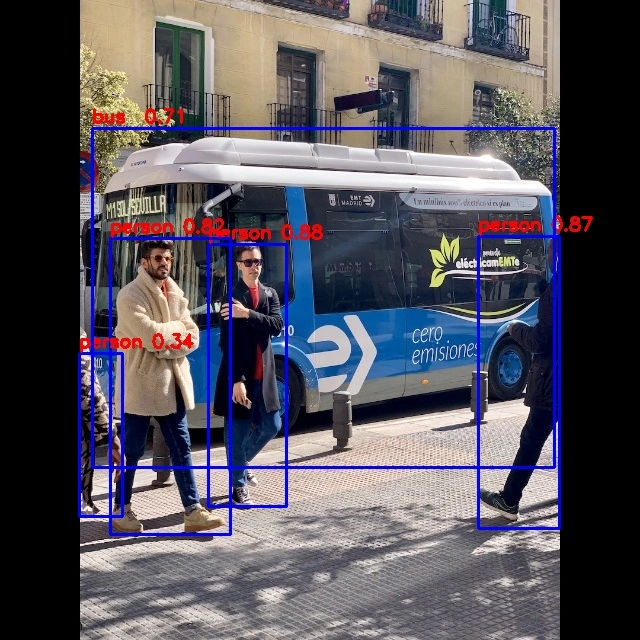Deploy YOLOv8 Object Detection on the Board
This document demonstrates how to run on-board inference of the YOLOv8 object detection model on the RK3588. For the required environment setup, please refer to RKNN Installation.
This example uses a pretrained ONNX model from the rknn_model_zoo as an example to illustrate the complete process of converting the model and performing inference on the board. The target platform for this example is RK3588.
Using RKNN to deploy YOLOv8 involves two steps:
- On a PC, use rknn-toolkit2 to convert models from different frameworks into RKNN format.
- On the board, use rknn-toolkit2-lite's Python API for model inference.
Model Conversion on PC
Radxa has provided a pre-converted yolov8.rknn model. Users can skip this section and refer to YOLOv8 Inference on Board.
-
If using Conda, activate the RKNN environment first:
X86 Linux PCconda activate rknn -
Download the YOLOv8 ONNX model:
X86 Linux PCcd rknn_model_zoo/examples/yolov8/model
# Download the pretrained yolov8n.onnx model
bash download_model.shIf you encounter network issues, you can download the corresponding model manually from this page and place it in the appropriate folder.
-
Convert the ONNX model to the RKNN format using rknn-toolkit2:
X86 Linux PCcd rknn_model_zoo/examples/yolov8/python
python3 convert.py ../model/yolov8n.onnx rk3588Parameter Explanation:
<onnx_model>: Specifies the path to the ONNX model.<TARGET_PLATFORM>: Specifies the NPU platform name. Options includerk3562, rk3566, rk3568, rk3576, rk3588, rk1808, rv1109, rv1126.<dtype> (optional): Specifies the data type asi8(for int8 quantization) orfp(for fp16 quantization). The default isi8.<output_rknn_path> (optional): Specifies the path for saving the RKNN model. By default, it is saved in the same directory as the ONNX model with the filenameyolov8.rknn.
-
Copy the
yolov8n.rknnmodel to the target board.
YOLOv8 Inference on Board
-
Download the
rknn-model-zoo-rk3588package to obtain the YOLOv8 demo (includes the pre-convertedyolov8.rknnmodel):Radxa OSsudo apt install rknn-model-zoo-rk3588If using a CLI version, you can download the package manually from the deb package download page.
-
Run the YOLOv8 example code:
If using a model converted on the PC, copy it to the board and specify the model path using the
--model_pathparameter:Radxa OScd /usr/share/rknn_model_zoo/examples/yolov8/python
sudo python3 yolov8.py --model_path ../model/yolov8.rknn --img_saveExample output:
Results$ sudo python3 yolov8.py --model_path ../model/yolov8.rknn --img_save
import rknn failed, try to import rknnlite
--> Init runtime environment
I RKNN: [09:01:01.819] RKNN Runtime Information, librknnrt version: 1.6.0
I RKNN: [09:01:01.819] RKNN Driver Information, version: 0.8.2
W RKNN: [09:01:01.819] Current driver version: 0.8.2, recommend to upgrade the driver to version >= 0.8.8
I RKNN: [09:01:01.819] RKNN Model Information, version: 6, target platform: rk3588
W RKNN: [09:01:01.836] Query dynamic range failed. Ret code: RKNN_ERR_MODEL_INVALID.
done
Model-../model/yolov8.rknn is rknn model, starting val
infer 1/1
IMG: bus.jpg
person @ (211 241 282 507) 0.872
person @ (109 235 225 536) 0.860
person @ (477 225 560 522) 0.856
person @ (79 327 116 513) 0.306
bus @ (95 136 549 449) 0.860
Detection result saved to ./result/bus.jpgParameter Explanation:
--model_path: Specifies the RKNN model path.--img_folder: Specifies the folder containing images for inference. Default is../model.--img_save: Whether to save the inference result images to the./resultfolder. Default isFalse.
-
All inference results are saved in the
./resultfolder.
